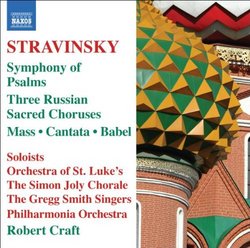| All Artists: Igor Stravinsky, Robert Craft, Mary Ann Hart, Orchestra of St. Luke's, Philharmonia Orchestra of London, Thomas Bogdan Title: Stravinsky: Symphony of Psalms Members Wishing: 0 Total Copies: 0 Label: Naxos Original Release Date: 1/1/2006 Re-Release Date: 10/31/2006 Genre: Classical Styles: Opera & Classical Vocal, Historical Periods, Modern, 20th, & 21st Century, Symphonies Number of Discs: 1 SwapaCD Credits: 1 UPC: 747313250424 |
Search - Igor Stravinsky, Robert Craft, Mary Ann Hart :: Stravinsky: Symphony of Psalms
 | Igor Stravinsky, Robert Craft, Mary Ann Hart Stravinsky: Symphony of Psalms Genre: Classical
|
Larger Image |
CD Details |
CD ReviewsRobert Craft Gives Us Special Stravinsky Choral Works J Scott Morrison | Middlebury VT, USA | 02/07/2007 (5 out of 5 stars) "This CD is a grab bag, but a very special one. It contains five choral works, garnered from fairly recent recordings on the Koch and MusicMasters labels, sung and played by exceedingly sensitive musicians and led by surely the best Stravinsky conductor we have, Robert Craft. These are among the best recordings I've ever heard of these works.
Probably the most important, and certainly the best known, work here is placed last: the Symphony of Psalms, with the Simon Joly Chorale and the Philharmonia Orchestra. This performance very much emphasizes that the work is for chorus with orchestra, not an orchestral work with incidental chorus, and it is generally gentler than most performances one hears. The Simon Joly Chorale is simply sensational here, with subtle inflections and dynamics, clear diction and impeccable intonation. Craft wisely lets the music unfold without any special rhetorical flourishes and in this respect it resembles Stravinsky's own classic recording. The very slow opening ('Alleluia. Laudate.') of the final movement, Psalm 150, is ecstatic, making the irruption of the agitato section all the more effective. This is a superior Symphony of Psalms. The disc opens with a cappella works, Three Russian Sacred Choruses, sung in Slavonic versions of the Pater Noster, Ave Maria and Credo. Texts with translations for these and the other works here are not in the Naxos booklet but can be found at www.naxos.com/libretti/symphonyofpsalms.htm . Craft conducts them slightly faster than Stravinsky does in his classic recording but they actually gain from that. The Gregg Smith Singers are the chorus. Mass (1944-48) was written in New York but there is absolutely no new world influence in the work, unlike other things he was writing at the time. It is sung by The Gregg Smith Singers, the group who also recorded the work in 1960 and who have sung it innumerable times since. This is glorious performance that I prefer by a slight margin to Stravinsky's own version, not only because it is in much better sound but also because the choral soloists are better. They are given superb support by members of the Orchestra of St. Luke's. The orchestration is especially inventive, consisting as it does of two quintets, one of oboes and bassoons and one of trumpets and trombones. Cantata (1951-52) is based on early English verses including the Elizabethan bridal song, 'The Maidens Came' and the traditional 'Tomorrow Shall Be My Dancing Day.' Written hard on the heels of Stravinsky finishing 'The Rake's Progress', the solos were written for two of the singers in that opera's premiere, Hugues Cuénod and Jennie Tourel. The musical forces, in addition to the tenor and mezzo soloists, are a female chorus (from The Gregg Smith Singers) and an instrumental quintet of two flutes, two oboes and cello. The excellent vocal soloists are Mary Ann Hart and Thomas Bogdan. The redoubtable Fred Sherry is the cellist. Finally, there is the brief 'Babel' that recounts the Genesis story of the building and destruction of the Tower of Babel. The piece was originally part of a suite of works by several composers (including Schoenberg) that retold Genesis texts. The work has a narrator who reads from Genesis, Chapter 11, verses 11-19, with one chorus sung (by the Simon Joly Chorale) to 'Behold the people is one, and they all have one language.' The orchestra, quite prominent in the work, is the Philharmonia at the top of their form. I had not listened to my old recording of Stravinsky conducting the work in many years, but on comparison with it I find that narrator David Wilson-Johnson is much superior to John Calicos on the old recording, largely because he is less overtly, how shall I say, hammy. This issue is impeccably presented and recorded. I would urge Stravinsky fans, even those who have earlier recordings, including those of the composer himself, to grab it. Scott Morrison" |

 Track Listings (19) - Disc #1
Track Listings (19) - Disc #1